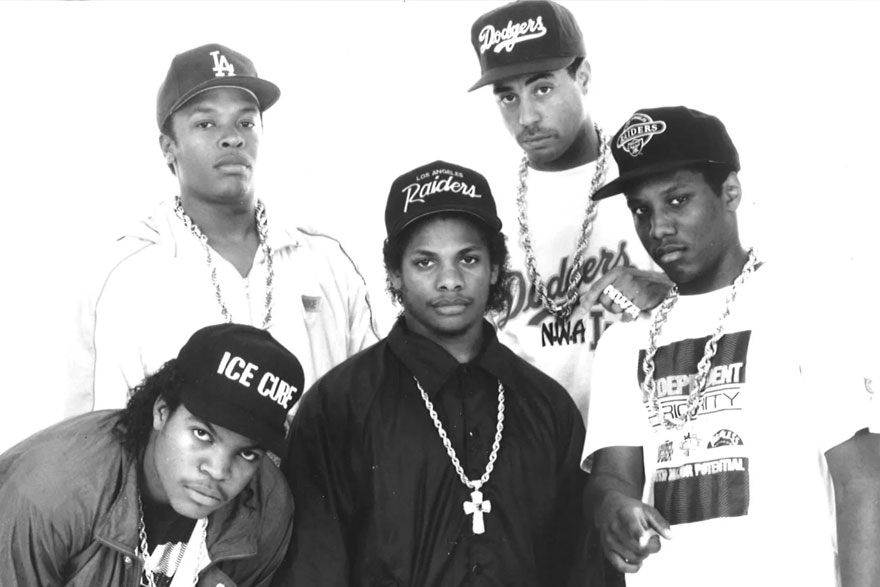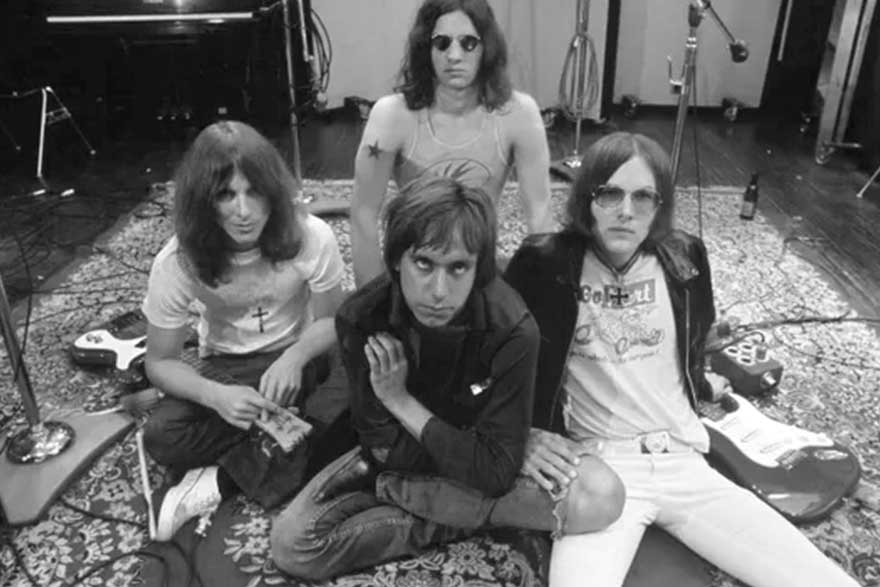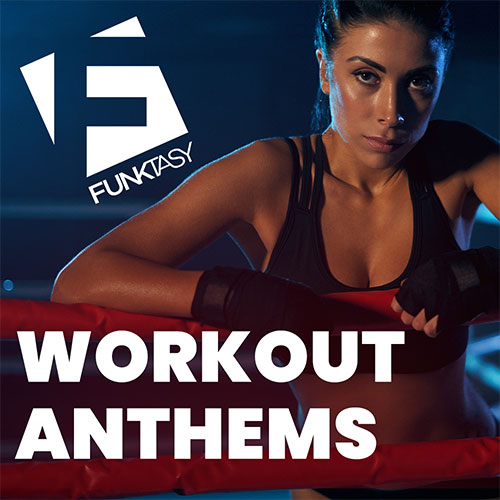A spirit of protest, rebellion, and antagonism has long lived inside the music of punk and hip-hop.
“And now I wanna be your dog
And now I wanna be your dog
And now I wanna be your dog”
These are the lyrics that make up the Stooges iconic breakout single, “I Wanna Be Your Dog off their debut self-titled album released in 1969.
The Stooges are now regarded as one of the greatest punk bands of all-time and the first one to gain mainstream popularity. Before the Ramones broke onto the NYC punk scene in the mid-seventies with “Blitzkrieg Bop”, with infectious hooks about substance abuse on “I Wanna Be Sedated” and youth rebellion on “Sheena Is A Punk Rocker”, The Stooges were writhing, bleeding and screaming onstage.
The Stooges May Have Been The World’s First Proper Punk Rock Band
Their impact was so large that Iggy Pop, the frontman of The Stooges and an iconic songwriter in his own right, is now considered to be the “Godfather of Punk” by The New York Times.
The Stooges broke out in 1969 with songs filled with depravity, rebellion and unabashed youth. With lyrics such as “Another year with nothing to do”, “Don’t you try, don’t you try to tell me what to do” and “Gimme danger, little stranger”, The Stooges pioneered the ambivalence and anarchic attitude that would go on to define the spirit of punk rock, as we know it today.
Back in the late 1960s, there weren’t any bands that exerted the same raw, live-wire musical tendencies as the Stooges. People were obsessed with safe, marketable love songs released by the likes of The Beatles and many weren’t ready for the unabashed attitude of this new band and this new style of music.
Iggy Pop’s performances were an act of rebellion in of itself, with the singer frequently appearing onstage in a frenzied state, writhing his wiry frame to the eclectic rhythm of their earliest tracks. The singer was even known to pull stunts such as cutting himself onstage and willingly throwing himself into piles of broken glass, too encompassed with the adrenaline of live performance – and the numbing properties of opium – to feel the pain.
Where Did Punk Rock Come From & Is It UK-Born?
Punk rock and rebellion are practically synonyms of each other. Some subsets of punk teach listeners to rise against fascism, while others teach young women to fight against the patriarchy, some punk speaks out against religion and some punk is supposedly apolitical and disaffected, which in of itself can be seen as a nihilistic rebellion.
Regardless of the subset, one thing about punk is clear: it attracts and fosters rebellion, especially amongst youth.
Punk rock in the U.K. was brought to life through the rubble of an economic crisis.
In June 1970, The BBC wrote “The Conservatives won the general election by 330 seats to 287 for Labour. This unexpected result appears to have reflected doubts about Labour’s economic management, a view focused by a poor set of trade figures. The failure of Labour to motivate its own supporters was also important. Evidence suggested that voters had turned against Harold Wilson, rather than towards the uncharismatic Edward Heath.”
With various aspects looming over Britain such as the IRA’s constant violent threats, the rise of second-wave feminism and Heath’s failure to adhere to his economic promises, the people of Britain became restless.
Thus, 1970s England has come to be known as “a decade which saw people choosing to rebel and break away from the gentle, domestic and materialistic way of life promoted by most of the country until that point.”, as published by the Bush Theatre Magazine.
There were economic and racial crises that preoccupied the public and allowed various other protests to ensue. In the early years of the decade, a severe economic crisis resulted in huge unemployment among young people and those employed in the public sector. Trade unions struggled to reach an agreement with a succession of weak governments and this resulted in a massive number of strikes and protest marches. Due to coal miners’ strikes in the early 1970s, a three-day workweek was established to preserve electricity. There were numerous clashes with the police as a result of this turmoil. In 1970, police racism appeared to be at an all-time high, causing even more societal divisions. Civil rights riots erupted across the country at the end of the decade, primarily between the National Front and organised anti-fascist and anti-racism committees.
Here Comes The Sex Pistols In The UK: Loud, Brash, & Iconic
In November 1976, the Sex Pistols released their first single “Anarchy In The UK”.
This song would go on to represent an entire nation of disgruntled citizens and is now synonymous with the punk movement.
“Anarchy In The UK” was the Sex Pistols first single and one of their most direct calls to action. Its provocative lyrics were aimed at British youth and called on them to be conscious of the corruption and moral bankruptcy present within the U.K. government, at the time of its release.
The lyrics challenge the government with statements such as:
“Is this the M.P.L.A.
Or is this the U.D.A.
Or is this the I.R.A.”
The MPLA is an Angolan political party that fought for the country’s independence, the UDA is the Ulster Defence Association, which was a loyalist supporter of the Northern Ireland conflict, and the IRA is the Irish Republican Army, which is anti-British and in favour of Northern Ireland unification.
Johnny Rotten follows up this provocation with trademark sarcasm; “I thought it was the UK”.

Hip-Hop Is Punk Rock By A Different Name And A Different Culture
Hip-hop has similar roots to punk rock, in that the genre rose to prominence amidst societal unrest and has thrived due to its rebellious nature.
Hip-hop is a revolutionary genre and many groups and artists, such as N.W.A, Tupac, Run DMC, Public Enemy, Child Gambino, The Fugees, Kendrick Lamar, Joey Bada$$, Lil Kim, Miss Lauryn Hill, and Queen Latifah, have used their music to speak on everything from racial inequality to feminism, police brutality, mass incarceration, revolution, and many other topics.
There are many parallels between punk and hip-hop, as both genres emerged in the late 1960s to early 1970s.
Hip-hop is said to have two recognized origin stories.
The Story Of The Last Poets In New York And Their Impact On Today’s Artists
The first is tied to a group named “The Last Poets”, a group of spoken word musicians who emerged in May 1968 in Harlem, New York. The group performed their poetry for the first time in Mount Morris Park, not two months after the assassination of Martin Luther King Jr. and in commemoration of what would’ve been Malcom X’s 43rd birthday.
The Last Poets spoke about racial inequality and the impact of Dr. King’s assassination, amongst other things, cementing them as the would-be forefathers of hip-hop.
Two years later, in 1970, The Last Poets would release their first album, a spoken word ensemble recited over the beats of a Conga drum, according to The Guardian.
The album is composed of impactful lyricism, with the subject matter ranging from commentary on racial inequality, calls for revolution and much more. The album was, and still is, revolutionary and The Last Poets’ impact on hip-hop, and the music world as a whole is undeniable.
Many popular hip-hop artists and groups, such as N.W.A, Dr. Dre, and Biggie Smalls have sampled their music throughout the decades and thus the songs continue to live on, even amidst modern hip-hop, according to NPR Magazine.
DJ Kool Herc & The More Widely Accepted Story Of How Hip-Hop Was Born
Here is the second origin story of hip-hop.
The genre is also said to have emerged in Harlem around 1973 in the Bronx, New York. A DJ and hip-hop artist, DJ Kool Herc, is said to have defined the genre and, similarly to Iggy Pop, is now known as the godfather of hip-hop.
DJ Kool Herc began hosting back to school parties in his apartment building and, during these parties, began to experiment with what is now known as “looping”. Looping, now an extremely popular production choice within hip-hop, as well as many other genres, began when DJ Kool Herc discovered he could use two turntables and play the same breakbeat section of a track on both. When one turntable would finish, the next would continue playing the same section, essentially prolonging the track indefinitely, until Herc decided to move on. DJ Kool Herc made another discovery during those early performances.
His interactions with the attendees, through the mic, were just as integral as the music itself in ensuring the party’s livelihood.
Upon this realization, DJ Kool Herc reached out to a close friend of his, Coke La Rock, and approached him with the concept of bringing him on as an MC at his events. La Rock agreed and together they made music history. Coke La Rock began to write and perform rhymes at these parties and became one of – if not the – first rap performer and artist.
This new genre of music was exciting and hip-hop solo artists and groups began to emerge at block parties, house parties and various other events throughout the 1970s.
The Influence Of The Origins On The Hip-Hop That Came Later In The 1980s
In the late 1970s and early 1980s, more and more hip-hop artists and groups began to get signed to record labels, who had discovered the genre’s lasting impact and power, and stopped viewing it as a fad.
Kurtis Blow, the first commercially successful rapper and the first rapper to be signed to a major label (Mercury Records), released his first self-titled album in 1980. The album broke into the mainstream and one of the singles “The Breaks” peaked at #87 on the Billboard Hot 100 and became the first Hip Hop song to be certified Gold, according to Discogs.
Check out a few of the lyrics from Kurtis Blow’s “The Breaks”:
“And the IRS says they want to chat
And you can’t explain why you claimed your cat
And Ma Bell sends you a whopping bill With eighteen phone calls to Brazil
And you borrowed money from the mob
And yesterday you lost your job
Well, these are the breaks
Break it up, break it up, break it up”
These are reminiscent of the messaging present on some of punk’s earliest tracks – such as The Ramones’ “Blitzkrieg Bop” and The Stooges’ “Gimme Danger”. The lyrics are aimed at the youth, encouraging them to let loose amidst societal pressure.
Other hip-hop songs took on a more straightforward approach in their lyricism, emulating some of punk’s more political groups, such as the Sex Pistols, the Dead Kennedys and the Clash.
One of these songs was another track released in 1980 by the Harlem World Crew. The song, “Rapper’s Convention” was openly critical of the Iran-Iraq war and more specifically, the USA’s involvement within it, at president Ronald Reagan’s behest.
Another hip-hop group from the early 1980s, Grandmaster Flash & The Furious Five, were similarly critical of the Reagan administration on their track “The Message”.
The song covers topics such as poverty, police brutality and the war on drugs. Though the song does not address it as such, nor does it name Reagan directly, the themes covered throughout the track were no doubt heavily influenced by the Reagan era and the racial inequality of the time, that the president was a huge contributor to.
An article sums it up quite well in the following way:
“They were singing about life in the housing projects as the deep recession of the early Reagan years hit the poorest the hardest. The economy tanked as the Fed raised the prime rate to over
20% and unemployment quickly spiked to over 10% of the US workforce” (Medium).
Hip-Hop & Punk Rock Are So Closely Related, They Might As Well Be Brother And Sister
As hip-hop continued to rise within mainstream culture, more and more artists utilized their voices to weigh in on societal inequities, specifically related to racial inequality, war (amidst the Reagan era), and American politics.
Groups such as N.W.A and Public Enemy were and continue to be seen as revolutionaries, releasing highly controversial and impactful tracks such as N.W.A.’s track “F*** The Police” and Public Enemy’s “Fight the Power”.
Today, many hip-hop artists continue to carry on the genre’s highly political background, with many artists such as Kendrick Lamar and Childish Gambino releasing albums and singles that concentrate heavily on societal issues.
Gambino’s “This is America” and Lamar’s “good kid, m.A.A.d. city” are two amazing examples.
The similarities between hip-hop and punk are widespread, with their politically charged roots and the spirit of rebellion that has always been, and continues to be, integral to the genres’ core.









